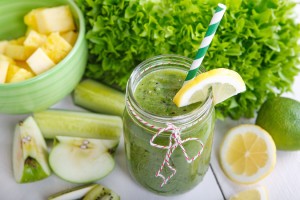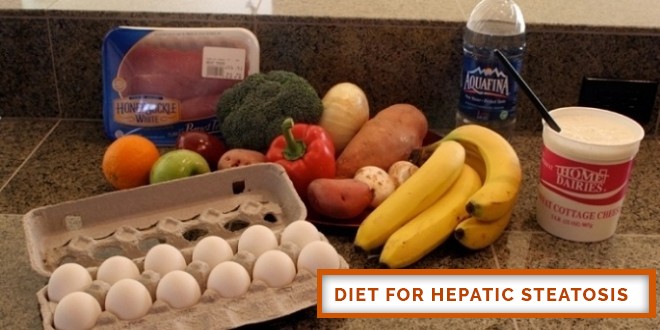Table of Contents
Diet for Hepatic Steatosis
Nonalcoholic fatty liver disease (NAFLD) or hepatic steatosis is a condition commonly found in overweight postmenopausal women. Contrarily, statistics of the past few years have revealed that the disease is increasing among people of all the age groups, both male and female. A review published in the December issue of Journal of Clinical Gastroenterology says that the growth proportion of NAFLD has directly related to the rapid increase in obesity.
Weight Loss and Clean Eating
Two things that majorly contribute to the onset of NAFLD are obesity and eating foods rich in corn syrup. The artificial sweeteners or corn syrup mostly contains fructose, which rapidly adds to the waistline increasing your weight. Similarly, almost all types of processed, refined and packaged goods are loaded with unhealthy colorants, preservatives and emulsifiers that release toxic, free radicals in the body thereby weakening immunity.
If you are obese and diagnosed with NAFLD, the first things you must do is stop eating all such foods and include only clean and organic produce in your diet.
Here is a clear review on Diet for Hepatic Steatosis and what to eat to get relief from NAFLD:
1. Eat Healthy Fats
Randomized trials have revealed that a low- fat diet decreases the fatty liver incidences as compared to high-fat diet. Health experts recommend decreasing the intake of saturated fats to around 6 to 7 percent and trans fats to around 1 percent. Foods that contain saturated fats include fatty beef, lamb, butter, lard and cream, beef fat, cheese, poultry fat with skin and more.
Foods that contain trans fats include French fries, fried chicken, doughnuts, margarine, creamer and more.
You must limit your intake of these foods according to the given dietary recommendations. Make sure that the total fat you eat should never exceed 25 to 35 percent of the total calories.
2. Add Monounsaturated Fats
Epidemiologic studies have revealed that the liver fat decreases significantly if you increased consumption of monounsaturated fat and ate a diet low in saturated and trans fat. That is one of the reasons; health experts recommend shifting to Mediterranean diet as it is rich in monounsaturated fatty acids (MUFAs). Foods that are a good source of MUFAs include olive oil, peanut oil, canola oil, sesame oil and safflower oil.
The MUFAs improve the plasma lipids causing the metabolic syndrome and leading to fatty deposits in the liver. Thus, including these fats in the diet provide a direct advantage in dealing with hepatic steatosis condition.
3. Omega-3 and 6 PUFAs
Randomized trials and studies show that high consumption of omega-3 reduces the risk of fatty liver disease, coronary heart disease and increases life. Omega-3 fatty acids have obtained from both plant and marine sources. Foods rich in omega-3 fatty acids include high-fat fish living in cold water, flax seeds, pumpkin seeds, walnuts, hemp seeds, hemp seed oil, Brazil nuts, avocado and more.
On the other hand, an increase in the consumption of omega-6 fatty acids in the past few years have been indirectly related to elevation in chronic inflammatory diseases such as cardiovascular disease, NAFLD and obesity. So you must limit its intake.
Mediterranean Diet –Ideal for Hepatic Steatosis
 Research has proved that the Mediterranean diet is extremely beneficial in improving health and increasing longevity. The diet emphasizes on whole grains, healthy fats, local produce and fish. Here are some diet tips to follow if you want to alleviate the symptoms of hepatic steatosis:
Research has proved that the Mediterranean diet is extremely beneficial in improving health and increasing longevity. The diet emphasizes on whole grains, healthy fats, local produce and fish. Here are some diet tips to follow if you want to alleviate the symptoms of hepatic steatosis:
1. Eat more fresh vegetables and fruits, especially non-starchy ones and try to include at least 5 to 7 servings of these raw or half-cooked.
2. Add healthy fats to your diet, such as olives and olive oil, avocados as these provide healthy MUFAs and a special plant compound known as polyphenols.
3. Legumes, nuts and seeds can be eaten raw or roasted. You can eat them as snacks, for garnishing a dessert or a snack or even add to a dish to add crunch. These provide a good amount of protein and fibre, antioxidants and healthy fats. Walnuts and almonds are the best inclusions.
4. Eat fish and eggs at least two times in a week as they provide healthy fats and proteins.
Eating a balanced diet in addition to popping your pills on time, will help you get recover sooner when suffering from hepatic steatosis.
These are the Diet for Hepatic Steatosis

